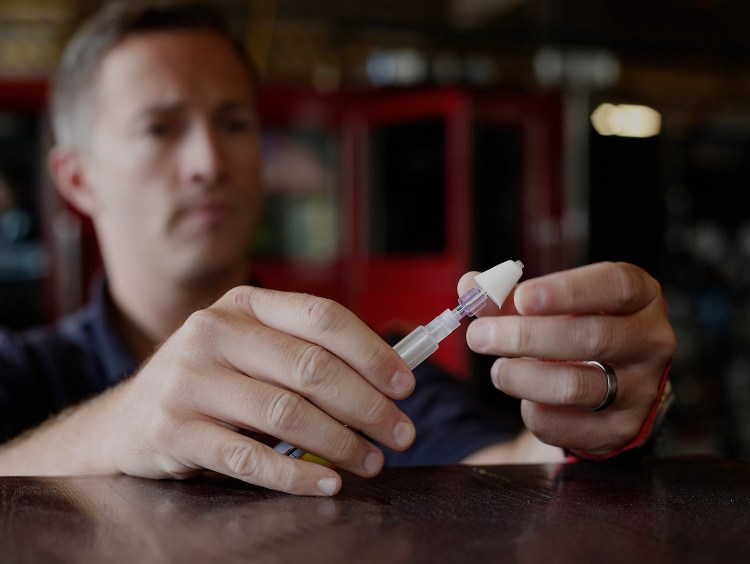AUGUSTA — Maine is close to joining roughly 30 other states in allowing the overdose reversal drug naloxone – commonly known as Narcan – to be sold without a prescription.
The Senate voted 25-8 and the House voted 98-49 Thursday to support a bill that would allow qualified pharmacists to provide the overdose antidote to first responders and family members of people suffering from heroin addiction. The margin of the vote increases the likelihood that the proposal, sponsored by Democratic Rep. Sara Gideon, the assistant House leader, will advance to Gov. Paul LePage.
The governor hasn’t yet taken a position on the bill, but he has been critical of previous legislative efforts to expand access to Narcan amid a drug epidemic that last year claimed 272 lives, a 31 percent increase in overdose deaths from 2014. LePage in 2014 allowed a bill expanding access to the drug to become law, but he has repeatedly ruminated over whether making the drug more available encouraged those suffering from addiction to continue using heroin.
Overriding a gubernatorial veto would require a two-thirds vote in the House and the Senate.
The governor’s concern was captured in the Senate debate. Sen. David Burns, R-Whiting, said passage of the bill would send a bad message to addicts who would have a “license to experiment.” Sen. Scott Cyrway, R-Benton, agreed, saying expanded access would enable people to continue using heroin.
Sen. Cathy Breen, D-Falmouth, countered that drug addiction is a disease.
“If my daughter’s inhaler is in the drawer and she has an asthma attack, I get it out and give it to her,” Breen said. “I don’t say, ‘Sorry you’ve had enough asthma treatment today.’”
Sen. Eric Brakey, R-Auburn, echoed that sentiment.
“You cannot learn the lesson of a terrible mistake if you’re not alive,” Brakey said.
Brakey’s opinion was shared by York Police Department Chief Douglas Bracey, who testified in support of the bill at a legislative committee hearing on behalf of the Maine Chiefs of Police Association.
“Although some would argue that we are enabling addicts to continue their ways, we would strongly disagree,” Bracey testified. “Most people don’t choose to become addicts.”
Other advocates for the bill said greater access to the drug will save lives. Bill Burns, testifying on behalf of Preble Street, told the Health and Human Services Committee how the Portland homeless shelter has been forced to alter its practices because of the high risk of overdoses. Burns said the shelter had to modify its bathrooms by cutting gaps at the bottom of stall doors and installing lights so that staff could determine “if someone has stopped moving.”
“In October, we had a woman who was sitting on the toilet – pants around her ankles, needle in neck – was unresponsive and barely breathing,” Burns told the committee, adding that staff quickly found another client with access to Naloxone who saved the woman’s life.
Naloxone, or Narcan, has become standard equipment for many rescue squads around the state as first responders encounter more opiate overdoses. In Portland, emergency responders with the Portland Fire Department used Narcan in overdose situations 107 times in 2014 and 134 times from January through Oct. 31 of 2015, the most recent figures available, according to city spokeswoman Jessica Grondin.
The bill, L.D. 1547, was requested by the CVS pharmacy chain and received support from the law enforcement and medical communities. CVS requested the legislation after receiving a letter from U.S. Sen. Angus King, I-Maine, asking the chain to expand the availability of naloxone without a prescription.
The bill, which is heading back to the Senate for another vote, requires pharmacists to receive training on naloxone and to provide information to recipients on administering the drug as well as the availability of drug treatment.
The Health and Human Services Committee endorsed the measure and amended it to include an immunity clause that provides protection from lawsuits to pharmacists as well as laypersons who administer the drug.
Maine already allows family members of opiate addicts to receive prescriptions for naloxone. The bill aims to make the antidote even more readily available.
Steve Mistler can be contacted at 620-7016 or at:
Send questions/comments to the editors.



Comments are no longer available on this story